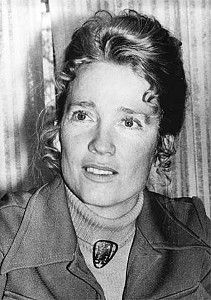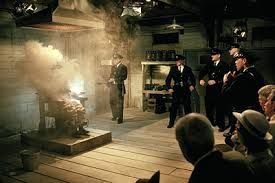Rose Bird’s ghost will kill CA death penalty
by John Seiler | January 22, 2015 11:37 am
 Given that Gov. Jerry Brown was just elected to an unprecedented fourth term, it’s not surprising an old controversy would come up: the death penalty. As the Los Angeles Times reported[1], his recent appointments of three liberal justices to the California Supreme Court give “hope” to those on the state’s death row.
Given that Gov. Jerry Brown was just elected to an unprecedented fourth term, it’s not surprising an old controversy would come up: the death penalty. As the Los Angeles Times reported[1], his recent appointments of three liberal justices to the California Supreme Court give “hope” to those on the state’s death row.
Of course, families and friends of the victims the death-row inmates killed may have a different opinion of whether there is “hope” for justice.
But the state has been through this before under Rose Bird, the controversial state Supreme Court chief justice Brown appointed in 1977, and who served until 1987. During her tenure, she voted against the death penalty 64 times in 64 appeals of death sentences. As a result, in 1986, voters refused to confirm[2] her position on the court, as well as two other anti-death penalty justices, Cruz Reynoso and Joseph Grodin.
The three were not, as commonly stated, “recalled” from the court, although justices can be recalled the way Gov. Gray Davis was in 2003. Rather, Bird and the other two justices failed a routine confirmation. As the Secretary of State’s office explains[3]: “Under the California Constitution, justices of the Supreme Court and the courts of appeal are subject to confirmation by the voters. The public votes ‘yes’ or ‘no’ on whether to retain each justice.”
Ballotpedia notes: “Justices of the California Supreme Court and California Courts of Appeal face retention to 12-year terms in the gubernatorial elections, which are held every four years in November.” Moreover, the only non-retention of justices in California history was that in 1986.
 Brown appointments
Brown appointments
Of Brown’s three recent appointments, in Nov. 2014, two were confirmed by voters: Goodwin Lieu (67.1 percent approval) and Mariano-Florentino Cuéllar (67.7 percent). So they next will go before voters, assuming they continue to hold these offices, in 2026.
The third justice, Leondra Kruger[4], was appointed after the election. So she will face confirmation by voters in 2018.
Brown also can be expected to appoint similar justices over his last four years in office. He has stated he wants to remake the court in an activist mode.
Which means the death penalty is dead in California — even though Brown, sloughing off Rose Bird’s legacy, won office in 2010[5] by saying he wouldn’t impede the death penalty.
Meanwhile, numerous court challenges[6] have prevented the death penalty from being imposed in California since 2006, leaving 748 convicted murderers on Death Row. And just 13 convicted killers [7]have been executed in the state since 1978.
In 2012, voters barely defeated Proposition 34[8] by 52 percent to 48 percent, which would have banned the state death penalty. Brown supported it.
Potentially, California could get around federal court limitations on the death penalty by adopting the methods of Texas, where 72 executions[9] have been carried out since 2010. But there’s no way the California Legislature would do that; nor would Gov. Jerry Brown sign any such legislation into law.
What likely will happen is that, once the Brown Justices become a four-member majority on the seven-member court, they will decide a case that finds the death penalty is “cruel and unusual punishment.” They will not be recalled. Nor will their future confirmations be denied.
This also means all the activism of pro-death penalty Californians over the years, believing the state was a democracy that followed the voters, was misguided, if not delusional. On this as on so many other issues, your vote does not count.
In California, the death penalty is dead.
(Note: The above picture is, of course, of the electric chair from the movie “The Green Mile.” In recent years, California used lethal injection. The picture was intended to depict the death penalty in general.)
- reported: http://www.latimes.com/local/crime/la-me-cal-supreme-court-20150121-story.html#page=1
- refused to confirm: http://en.wikipedia.org/wiki/Rose_Bird#Reconfirmation_loss
- explains: http://www.voterguide.sos.ca.gov/en/justices/supreme-court-justices/
- Leondra Kruger: http://www.dailynews.com/opinion/20141201/jerry-browns-supreme-court-appointee-leondra-kruger-reminiscent-of-his-first-term-thomas-elias
- won office in 2010: http://www.sfgate.com/politics/article/Brown-s-death-penalty-stance-a-likely-debate-topic-3251784.php
- court challenges: http://www.cnn.com/2014/07/16/justice/california-death-penalty/
- 13 convicted killers : http://www.cdcr.ca.gov/Capital_Punishment/Inmates_Executed.html
- Proposition 34: http://ballotpedia.org/California_Proposition_34,_the_End_the_Death_Penalty_Initiative_%282012%29
- 72 executions: http://en.wikipedia.org/wiki/Lists_of_people_executed_in_Texas
Source URL: https://calwatchdog.com/2015/01/22/rose-birds-ghost-will-kill-ca-death-penalty/